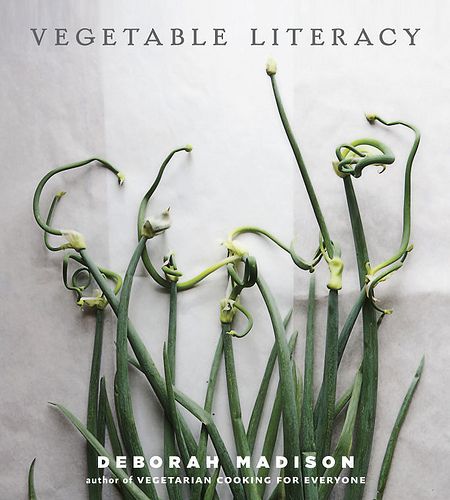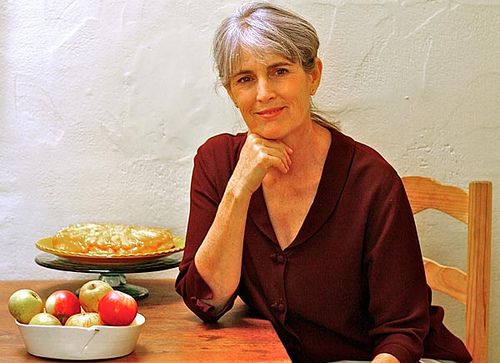We're sitting down with our favorite writers and cooks to talk about their upcoming cookbooks, their best food memories, and just about anything else.
Today: We discuss all things vegetable with Deborah Madison: chef, passionate gardener, and author of Vegetable Literacy. Want to learn from her firsthand? Sign up for a Mediterranean cooking immersion with Deborah and Nancy Harmon Jenkins!


Deborah Madison began cooking farm-to-table food before the phrase entered our cultural lexicon or any of our neighborhood menus. From her childhood on a farm, to her experience cooking with Alice Waters at Chez Panisse, to opening San Francisco's Greens Restaurant, Deborah's career has always centered around the places where farms and plates meet.
In her new book, Vegetable Literacy, Deborah has changed the way we understand the vegetables in our gardens and on our plates by shedding light on the relationships within various plant families and using that knowledge to enlighten our home cooking. Comprehensive yet accessible, the book lies somewhere between the exact science of gardening and the art of cooking; it will simultaneously have you underlining fun facts and earmarking every other page with recipes you'd like to make tonight. In today's interview, we chat with her about the writing process, her cooking style, and the under-appreciated cabbage.
Vegetable Literacy covers the gamut of vegetables and herbs, from celery to chervil to cardoons. In your opinion, what is the most under-appreciated or misunderstood vegetable?
I suspect that those vegetables in the cabbage family are probably both most under-appreciated and misunderstood. People tend to think of broccoli and cauliflower as winter vegetables, yet they grow and make their crowns and heads in the summer and fall, and when they're truly seasonal they have a sweetness and delicacy that many might find surprising. People also tend think cauliflower, brussels sprouts and cabbage are going to be odiferous and strong tasting, but that also depends on how they're cooked. They're actually delicate, especially cauliflower.
Above all else, what do you hope that people will take away from your book?
Mostly, I hope readers take away the sense of joy that comes with knowing plants and how they relate to one another, and what amazing creatures they are. I love to hear people exclaim, "Really? I didn't know that chard, spinach, beets are all related. You mean, I can use those greens interchangeably?" And of course they can, more or less, so I also hope that kind of knowledge makes people more confident and relaxed in their kitchens, more free to cook and have a good time with it.
What drove you to write such a comprehensive book with this angle?
My gardening attempts had a lot to do with it, and the fact that I've been involved with plant foods for so many years. But I also wanted to look beyond the pretty vegetable and find out what made it tick. At some point I started noticing relationships among plants -- their flowers, the shapes of their leaves, how they grew, how they tasted (some actually taste salty, for example), and I started thinking about plant families and how they're similar to human families. We say things like, "you've got your dad's nose or your grandmother's spirit," and I began to wonder if it wasn't the same in the plant world. Noticing relationships is very exciting: suddenly your world opens up and you start making connections -- especially when you start to garden, even if it's just some lettuce in a pot.
Actually, Vegetable Literacy wasn't as comprehensive as I'd like it to be. I'm still thinking about the very compelling laurel family with its avocados, bay laurel, California bay, sassafras, and cinnamon that I had to leave out, along with others.
What did the writing process look like; how long did it take you?
There were different stages of making Vegetable Literacy. There was growing and observing the garden, then going back inside to make notes, then following up on hunches with lots of poring over botany books and talking to farmers and gardeners. Naturally, there was cooking from the garden and jotting down some recipes.
I'd been doing all of this without a book in mind for a few years and had already amassed quite a few notes, many recipes, and experience. Then it happened quickly, maybe a year and a half? I don't even know for sure; this was a little fast for me. But thank heavens for winter when the garden is quiet -- it made it possible to hunker down and do what had to be done.
When you're home alone, what are you most likely to cook for yourself?
I cook pretty much the kind of food that's in the book, and we often make the simplest meals from a single vegetable and maybe a salad or soup.
I also entertain a lot, and I love to cook from other people's books and be inside their minds for an afternoon. I even like to cook from my own books. But when you're writing a book, you're on its agenda, not yours. At the moment, I'm figuring out what I like to cook and eat all over again.



See what other Food52 readers are saying.